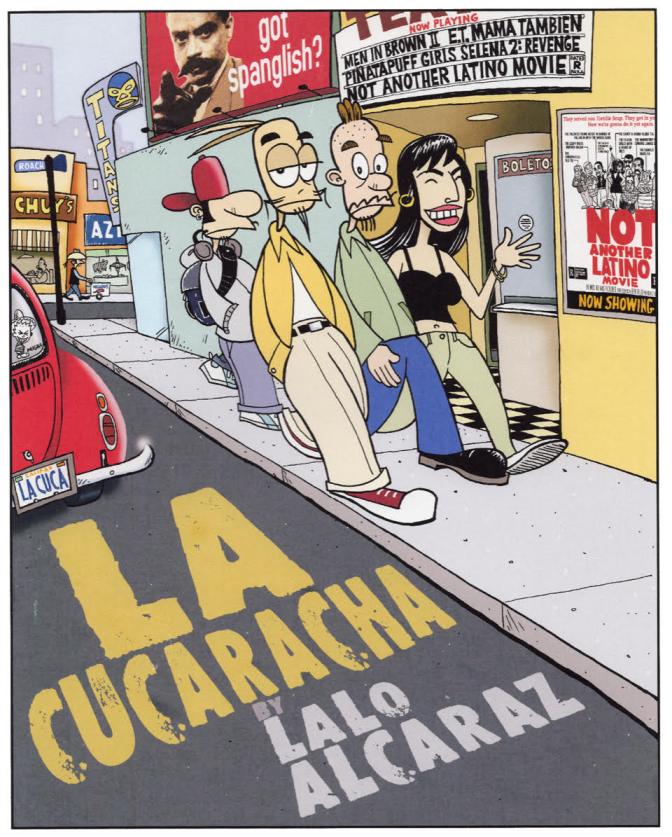I was a teenager growing up in Southern California when I first came upon Lalo Alcaraz’s comic strip La Cucaracha in the Los Angeles Times. My hometown of Fontana has an ugly history of white supremacy, and racism would often pop up in unexpected ways. The world of La Cucaracha—especially the main characters Eddie, Cuco, and Vero—helped me, a young Mexican-American woman, process my experience. I would often save clippings of my favorites. Sometimes I would collect strips because they seemed to say something important about my social and political milieu; other times I did so simply because I thought they were cool. That isn’t to say superficial: seeing one’s teenage self reflected in something cool was a balm that soothed the wound of internalized racism. Because it resonated with me (and not my Mexican immigrant parents), Lalo Alcaraz’s work also felt uniquely mine.
Now, Alcaraz is celebrating La Cucaracha’s twentieth anniversary as the first Latino-themed nationally syndicated political comic strip. He is also the recipient of the prestigious 2022 Herblock Prize for editorial cartooning, and the only person of color ever to receive the award. “I hate stuff that’s watered down and not specific. The more specific you are when you create art, the more universal it is,” Alcaraz told the Los Angeles Times back in 2002. That same sentiment has characterized his entire career. Besides his editorial cartoons, Alcaraz is also a writer, producer, and cultural consultant for animation, film, and television, as well as the founder of the satirical magazine POCHO. (Pocho is a pejorative slang term that refers to Mexican Americans, Mexican emigrants, expatriates, or other people of Mexican ancestry who lack fluency in Spanish and are unfamiliar with Mexican culture.)

Alcaraz’s long resume of accomplishments comes with an equally extensive collection of hate mail (and, more recently, scathing comments on social media). This was the inspiration for the title of the new exhibit, Please Forward My Hate Mail, on view through March 30 at Alcaraz’s alma mater, San Diego State University. It was there, in 1984, that his career took off as the editorial cartoonist for the Aztec Daily, the university’s independent student newspaper. Alacaraz’s biting satire inspired so much hate mail that it became both an intrinsic part of his art and inspired his nickname.
The SDSU show includes a balance of Alcaraz’s early and more recent work. Important moments in his career are well-represented, including giclee prints of La Cucaracha and Migra Mouse, the latter depicting Mickey Mouse in a border patrol uniform as he criticizes Disney’s financial contributions to Pete Wilson’s gubernatorial campaign in 1994. Back then, Proposition 187 was seeking to prohibit undocumented immigrants from accessing health care, public education, and other services in the state. Migra Mouse became a widely used symbol among protesters. Among Alcaraz’s most recent pieces is another Disney-inspired cartoon, this time a movie poster featuring the figure of Pinocchio with an elongated nose. The text beneath him reads The GOP Presents George Santos. There’s also a Disney-styled Disinfo at the bottom.
Not all of Alcaraz’s pieces are satirical, though. Some, like Lil’ Judge Lopez, commemorate important historical moments for the U.S. Latino community. Here, Alcaraz uses his daughter as a model for a little Latina girl, whom we see seated behind an upturned cardboard box doubling as a desk. She imagines herself as Judge Lopez, with a poster of the then newly appointed Supreme Court Justice Sonia Sotomayor and a jury made up of toys behind her. The effect is poignant, as Lalo subverts the vitriol and disrespect so often hurled at Sotomayor by showing the childlike joy and hopeful dreaming she inspires.

One evening in late March, San Diego State University gathered students, fans, community leaders, and friends of Lalo Alcaraz for a panel discussion with the artist. Though the lecture hall was nearly at capacity, the discussion was informal and intimate, a testament to the way in which Alcaraz’s work has inspired and empowered the Chicano community in his hometown. In her remarks, art historian and gallerist Alessandra Moctezuma described Alcaraz’s satirical cartoons as “carnivalesque.” It was a way of highlighting how his drawings subvert the powerful while offering a “release valve” of liberation to the oppressed and disenfranchised. Our chaotic social and political realities have become increasingly ridiculous, and nearly unbelievable. That presents a challenge for satirists like Alcaraz, whose work often uses chaos to point out the absurdity of present injustices. How to find new ways of articulating and transcending that disorder?
Several pieces in the show do just that. Consisting of large prints on foam, they are part of Alcaraz’s 2022 Herblock Prize portfolio. In these cartoons, Alcaraz takes on Trump, the pandemic, the January 6 insurrection, billionaires, women’s oppression, Ted Cruz, and border patrol, to name a few subjects. One of the most powerful, “The U.S. Border Patrol Protecting America since 1619,” takes on a darker tone. The cartoon was published in response to the September 2021 release of photos and videos that show border patrol agents on horseback violently chasing Haitian migrants along the Rio Grande. Alcaraz’s cartoon, stylized as a black-and-white ink print from the seventeenth-century, complete with a vintage font, shows a Black man being whipped by a border agent on horseback. It invites us to realize that this kind of violence should not be so shocking in America: indeed it has been standard practice since the first African slaves were forcibly brought here to work on the farms and plantations that fueled the country’s growth. The cartoon is classic Lalo Alcaraz: direct and unflinching, but also very funny. It takes a lot of courage, and a good deal of hope, to laugh in the face of hatred. But perhaps it’s the best way of reclaiming one’s humanity instead of succumbing to unspeakable pain.
Please Forward My Hate Mail, a Lalo Alcaraz Popup Exhibition, is on view at Arts Alive San Diego State University through March 30, 2023.
